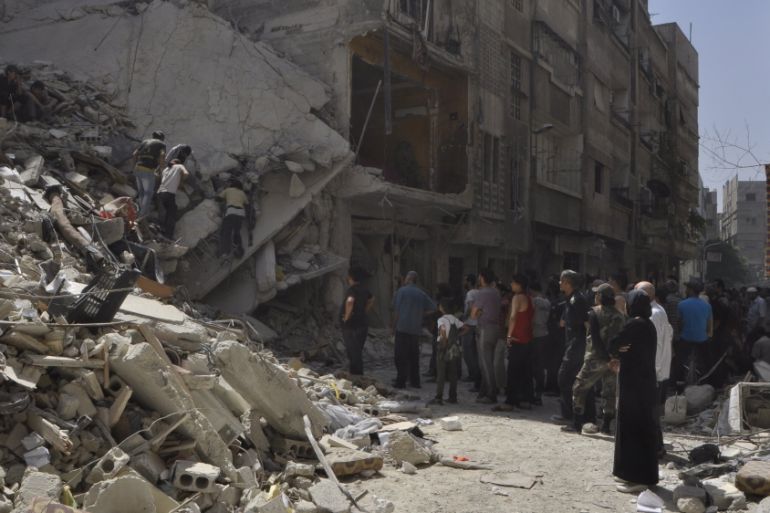Evacuation from Syria’s Yarmouk camp paused
Evacuation plan for armed groups from a Palestinian camp in Damascus is in limbo amid conflicting reports on pullout.

A plan to evacuate armed groups and families from the Damascus-area Yarmouk refugee camp and nearby areas has been put in limbo following the assassination of a Syrian rebel leader, according to reports.
The plan was set to evacuate thousands of fighters from armed opposition groups from the embattled Palestinian refugee camp, the al-Qadam suburb and the al-Hajar al-Aswad neighbourhood to opposition-controlled areas elsewhere in Syria, including pockets of land controlled by the Islamic State of Iraq and the Levant (ISIL) group and the al-Nusra Front.
Keep reading
list of 4 items‘Mama we’re dying’: Only able to hear her kids in Gaza in their final days
Europe pledges to boost aid to Sudan on unwelcome war anniversary
Birth, death, escape: Three women’s struggle through Sudan’s war
According to the Lebanese group Hezbollah’s Al-Manar television channel, 18 buses arrived in the area on Friday afternoon, but the deal was paused after the killing of Zahran Alloush, the leader of the Army of Islam armed group.
|
|
| ‘Rebels to leave’ Damascus suburbs under deal |
The buses were reportedly guaranteed safe passage through territory controlled by the Army of Islam, reported Al-Manar.
However, according to Yarmouk Camp News, an Arabic-language Facebook page that provides updates for Yarmouk residents, the deal “has not been cancelled” and the factions are currently negotiating the logistics of withdrawing from the camp.
In a statement released on Saturday, the UK-based Action Group for Palestinians of Syria said that neither ISIL nor the Syrian government “issued any formal statement [explaining] the nature of the agreement or its conditions, or the fate of the whole area after [ISIL’s] departure”.
READ MORE: Who can save Yarmouk?
Yarmouk, first built for Palestinian refugees expelled from their homeland during Israel’s 1948 establishment, was once home to nearly 200,000 UN-registered Palestinian refugees and Syrians.
Yet the camp has been hit hard by the violence in Syria, which initially started as an unarmed uprising against President Bashar al-Assad in March 2011 and has since grown into a full-blown armed conflict that has killed more than 250,000 people, according to UN statistics.
Besieged
After armed opposition groups entered the camp, Syrian government forces bombed Yarmouk and killed dozens of civilians in December 2012. The Syrian army besieged the camp, erecting checkpoints at its entrances and severely restricting the entry of humanitarian goods, including food and medicine.
Chris Gunness, spokesman for the UN agency for Palestine refugees (UNRWA), said that civilians in the camp are “living in deeply abject conditions”.
Due to the government-imposed siege, hundreds of residents starved to death, while reports told of mass malnutrition and people being reduced to eating stray animals and grass in order to survive.
![On January 31, 2014, residents of the besieged Palestinian camp of Yarmouk queued to receive food supplies [File: UNRWA/AP]](/wp-content/uploads/2015/12/2e1936bbced845728e29390170285ecc_18.jpeg)
Although the UN removed Yarmouk from its list of besieged communities in July, conditions on the ground have only worsened, according to residents and humanitarian groups.
“UNRWA welcomes any developments that could end the armed conflict in and around Yarmouk, and ease the inhuman conditions that Palestine refugees and other civilians are in Yarmouk continue to endure,” Gunness told Al Jazeera.
Gunness added that the UN agency “is redoubling its strong appeals to the government of Syria and relevant actors to allow and facilitate humanitarian access to Yarmouk”.
Between 5,000 and 8,000 civilians remain inside the camp, according to the Yarmouk-based Jafra Foundation, a humanitarian group.
The UN has been unable to access the area since shortly before ISIL invaded and captured an estimated 90 percent of the camp. Although ISIL fighters pulled out within days, they maintained a heavy presence in the surrounding areas, while the al-Nusra Front remained inside Yarmouk’s interior.
Aknaf Bait al-Maqdis, a Hamas-affiliated armed group, fought against both ISIL and the al-Nusra Front, but most of their ranks were pushed out of the camp following the ISIL takeover.
READ MORE: Palestinians in Syria desperately need Yarmouk truce
Between April and August, ISIL and the al-Nusra Front assassinated more than 30 local Palestinian political and military leaders, mostly from Hamas, according to Wesam Sabaaneh, a coordinator at the Jafra Foundation.
Since the outbreak of the Syrian uprising, the Action Group has documented the deaths of at least 3,084 Palestinians, including 415 women. An estimated 1,022 Palestinians are in Syrian prisons, while some 282 cannot be accounted for.
Although neighbouring countries have closed the borders on them, Jafra estimates that 150,000 of the more than five million Palestinian refugees from Syria have fled the country.
Of the 450,000 Palestinians remaining in Syria, more than 100,000 live in areas “with restricted humanitarian access”, the group said in a statement.
Elsewhere, Khan Eshieh, another Palestinian camp near Damascus, was reportedly hit with six barrel bombs on Friday. The Action Group said that Khan Eshieh and “its surroundings are witnessing increasing military actions, especially air raids”.
Follow Patrick Strickland on Twitter: @P_Strickland_